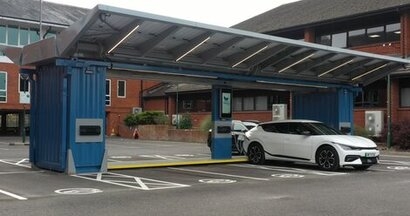
Surrey Research Park, Guildford, is home to over 200 innovative businesses, from newly formed start-ups to global corporates such as Airbus and BAE Systems. Owned by the University of Surrey, the Research Park businesses employ over 4500 staff and was the preferred locational choice because of the Park’s client base, its growing cluster of companies working on sustainability and the deep links with the University of Surrey.
Papilio3 tackles the UK’s need to expand electric vehicle (EV) infrastructure ahead of the government’s proposed ban on the sale of new diesel and petrol vehicles in 2030. The unit is built around a recycled shipping container and can support up to 12 fast EV charge points. The solar and battery-boosted charging system optimises the speed of charge and reduces the carbon intensity of electricity used. Papilio3 is available from 3ti on a rental contract and therefore requires no capital investment by customers.
“Overnight charging at home generally provides the most cost effective, carbon efficient, sustainable form of EV charging, but in the UK, around 50 percent of households will not be able to do this” said Tim Evans, 3ti founder & CEO. Mr Evans led the teams responsible for the two largest SCPs in the UK, at Bentley Motors, Crewe and JP Morgan, Bournemouth.
“If you live in a flat, a tower block, a rented house, in temporary accommodation or even in a £10 million terraced town house in Chelsea, you’re probably not going to be able to charge an EV at home. We believe that solar and battery boosted destination and workplace charging will become the best EV charging solution for drivers, irrespective of the type of home they live in. By utilising dwell times of several hours, when cars are parked at work or when the driver is visiting a shopping or leisure venue, for example, 3ti’s system ensures that EVs can achieve a level of charge that covers day to day driving needs and does it in the most low carbon way.”
Papilio3 is fitted with three modular canopies that support 36 solar panels and has battery storage capacity of up to 250 kWh. It has been developed by 3ti with Cambridge Design Partners, and has been designed for roll-out at workplaces and public destinations such as hospitals, hotels, meeting venues, sports or shopping centres, tourist attractions and town centres. Each unit offers sheltered, illuminated and secure parking, plus a convenient, available and reliable EV charging experience that supports a mixture of 7, 11 and 22 kilowatts.
Papilio3 integrates three technologies that are more usually considered individually: solar photovoltaic electricity generation, Battery Energy Storage Systems (BESS) and EV charge points. Combining the three offers a range of benefits, including the ability to use grid energy, solar power and battery storage to optimise the speed and carbon intensity of EV charging. Onsite renewable energy generation from solar panels also reduces energy costs and gives businesses greater control over energy supply.
Long lead times caused by complex planning approvals and investment requirements were traditional barriers to SCP installations. Papilio3 units are owned by 3ti, provided on a monthly rental basis and require limited approvals, overcoming these hurdles by enabling a 24-hour deployment and installation time, and requiring no capital investment by customers.
“Widespread adoption of SCPs will turn underutilised spaces into renewable energy generating assets, and adding batteries and EV charge points will accelerate decarbonisation of the UK’s transport sector” Mr Evans added. “Allowing businesses to generate renewable energy right outside their front door not only gives them greater control of energy costs, it also makes a huge statement to customers and visitors that they are serious about tackling climate change and reducing carbon emissions. By deploying fast charge points, up to 12 at a time, with Papilio3, we will provide much needed, cost effective charge point infrastructure and expand the UK’s network of public EV charge points. Papilio3 isn’t just about providing the UK with a broader range of EV charge points,” concludes Evans. “It also focuses on the capture and management of renewable energy, as a way of reducing the country’s draw on carbon-intensive energy for EV charging at peak times.”
A typical solar car park with 350 spaces, will produce around 900,000 kWh of electricity a year and would save the equivalent of 6,000 tonnes of carbon emissions (tCO2e) over a 30 year period, according to UK government figures. This equates to powering around 7,000 homes or planting 100,000 trees.
The UK requires 2.8 million public EV charge points by 2035. There are currently just 52,000.
There are around 20,000 public car parks with 4 million parking spaces and a further 9 million workplace parking spaces in the UK. At a theoretical 3 kWp of solar per parking space, that’s 39,000 MWp of installed capacity, enough to meet 140 percent of the UK’s annual electricity demand.
The UK is currently rolling out electric vehicle supply equipment at a rate of around 17,000 public charge points per year. As EV sales increase, the ratio of charge points to EVs is actually falling. With a target ratio of 1:10, recent figures suggest that the actual position is currently closer to 1 public charge point for every 52 EVs.
For additional information:

